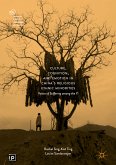In doing so, the contributors seek to support indigenous communities in the recovery of their voice, original vision, and ancient practices, and to follow their yearning as echoed in T. S. Eliot's words: "In my beginning is my end." The book is replete with examples of this recovery of indigeneity in, for example, Chinese notions of harmony and resilience; cultural differences in hearing the voice of the divine; the influence of animism on Christians in Korea; and in savoring the bereavement of loved ones.
This novel collection presents fresh insights for students and scholars of the psychology of religion, indigenous studies, cultural psychology, and anthropology.
Dieser Download kann aus rechtlichen Gründen nur mit Rechnungsadresse in A, B, BG, CY, CZ, D, DK, EW, E, FIN, F, GR, HR, H, IRL, I, LT, L, LR, M, NL, PL, P, R, S, SLO, SK ausgeliefert werden.









